Since fighting engulfed Sudan in April 2023, activists on social media have been at the forefront of mobilization and awareness-building.
We asked them: what drives your advocacy? What inspires your work? How do you use your platform to fight for change? Here’s what they shared.
Daad is a New York-based Sudanese lifestyle influencer mobilizing support for Sudan.
“If you still think your voice doesn’t matter, let me explain [Instagram] ranking to you: an algorithmic system that boosts keywords to the top depending on their usage.
Speak about Sudan.
Speak about every injustice.
You can change the world with a post, a story, an act because you’re a part of 7 billion others doing the same.
So do something.”
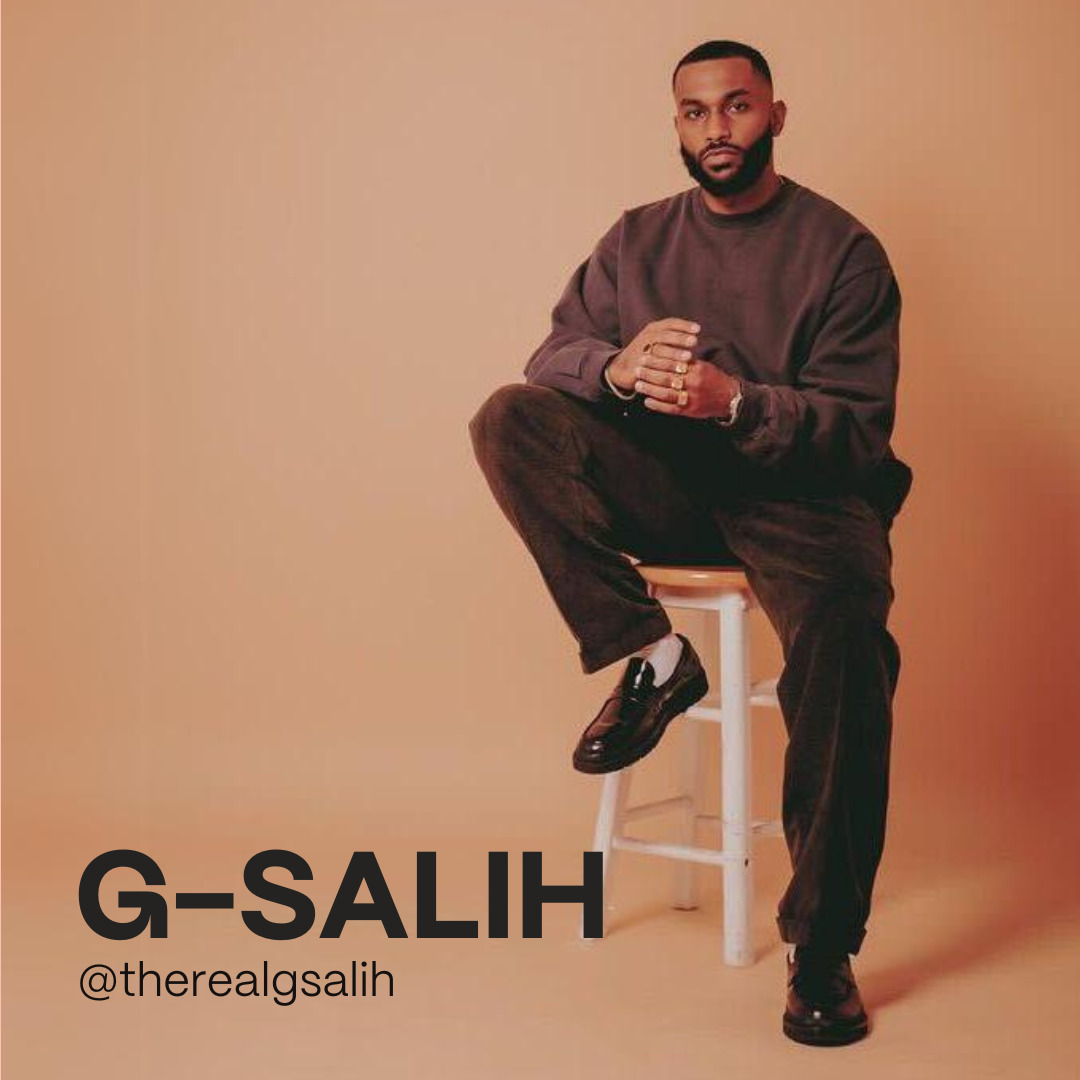
G-SALIH is a Virginia-based Sudanese musician and artist.
“In the midst of the anguish and uncertainty that comes with watching your country fall into war, the resilience and strength of the Sudanese people shines so bright.
Community-led groups in Sudan and in every corner of the world took it upon themselves to provide aid, spread information, and make sure their voices are heard.
I’ve seen the light in conversations with my family and friends who need as much help as they can get yet are so willing to extend their generosity to others without a second thought.
I’ve seen it in events I’ve worked with SDN [Sudanese Diaspora Netowrk] and other diasporan groups to organize, raising more than $17,000 towards medical aid and mental health support services.
I’ve seen it in the faces of crowds at my shows, and in their eyes when they tell me how proud they are to know that I’m Sudanese.
All the while, being Sudanese fills ME with immense pride; knowing that the beauty of my people runs through my veins.
In the darkest of times, it’s so important that we continue to use our platforms to share each other’s stories, expose injustice, and continue to support each other.
Our voices have never and will never go unheard.
And at the very least, our roles are to amplify and bring awareness to the reality of our situation.
And we’ll never stop.”
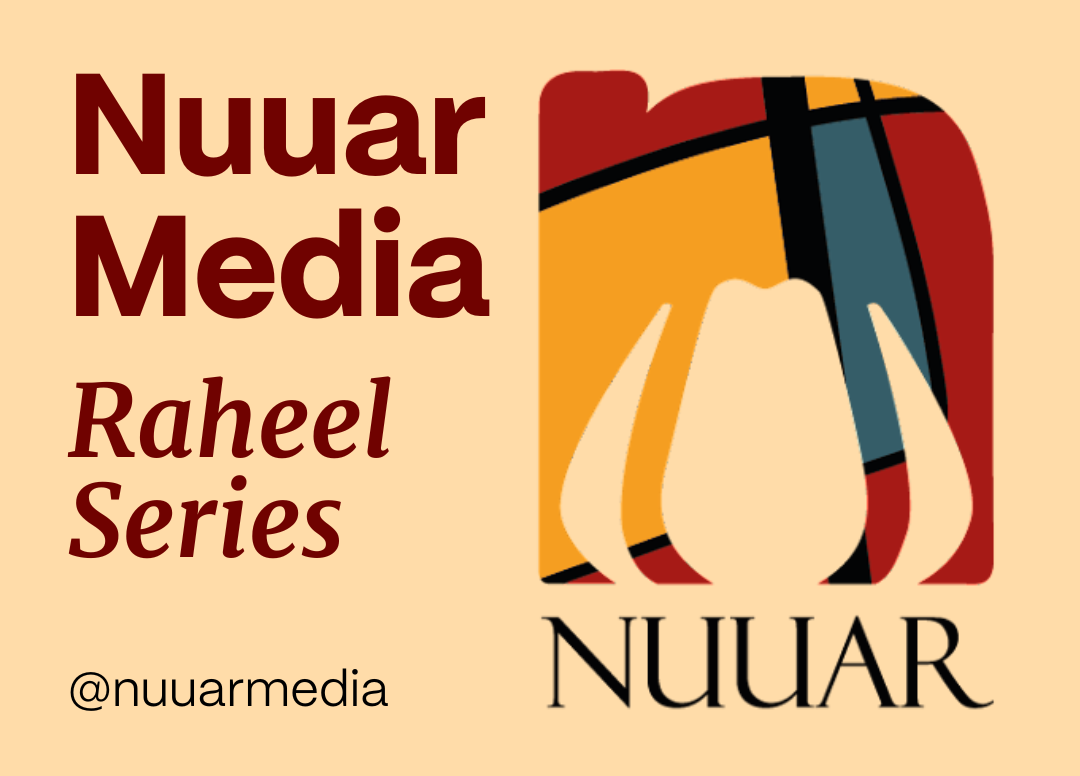
Nuuar Media is a storytelling platform by Sudanese for Sudanese based in Sudan.
“Raheel is a series about Sudanese civilians who tell their stories of displacement from the April 15th war and discuss how their mindset has been affected with this experience.
In wars throughout the world, the voice of those in power and with guns is what is always the loudest. Civilians, when discussed in conflicts, are commonly portrayed as voiceless recipients of violence with hardly any agency to respond.
Raheel challenges that and is a reminder that vulnerability and weakness does not mean that there is no longer a space to non-violently resist. Because civilian voices matter.”
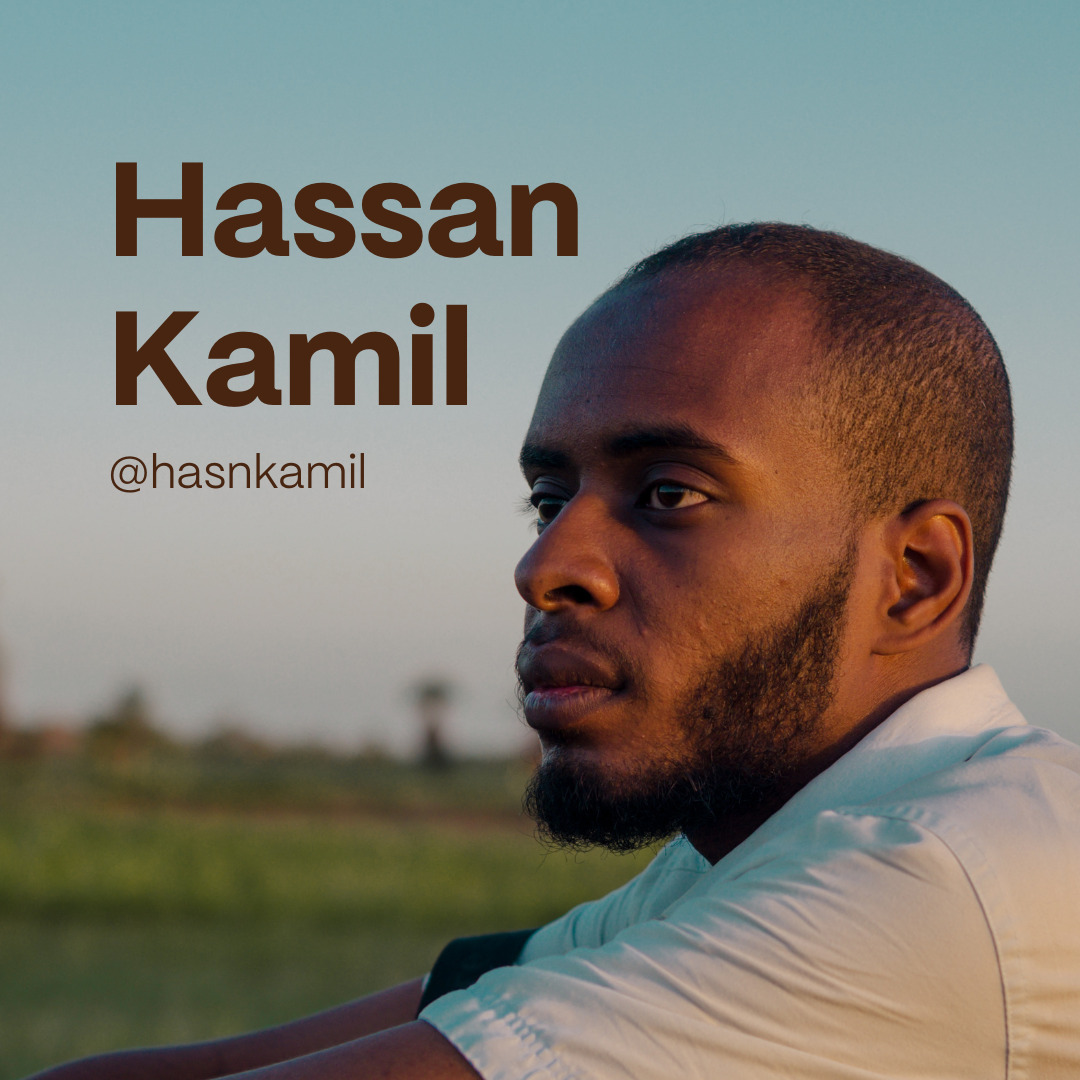
Hassan is a Sudanese photographer committed to sharing the beauty of Sudan with the world through his eyes.
“I have always regarded photography and filmmaking as the utmost personal form of self-expression, and my endeavors are consistently driven by my own life encounters.
For a considerable period, I have been recounting tales of Sudan.
Through my projects, I have delved into the essence of our cities and the transformations they undergo from my vantage point.
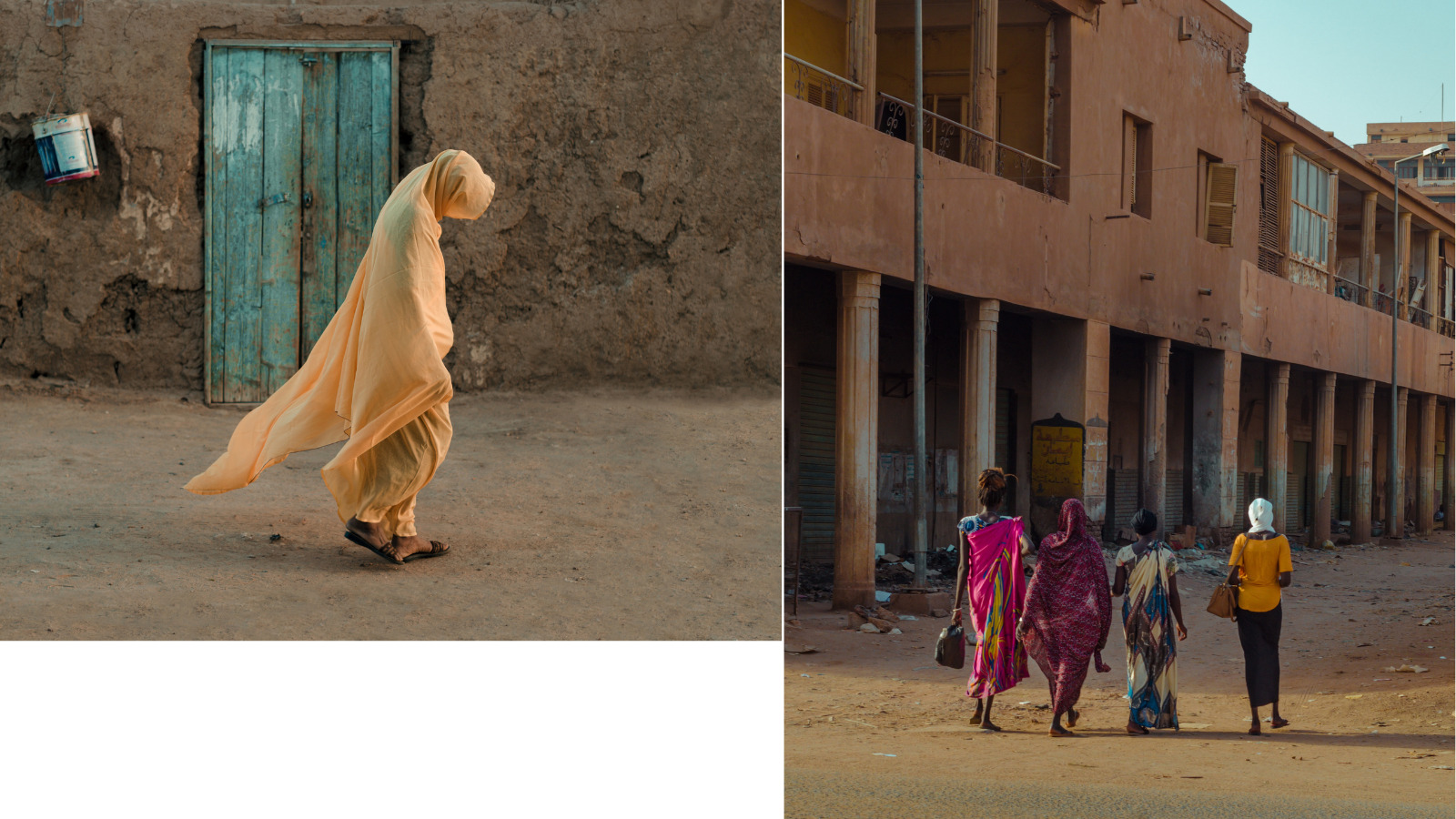
Left: Part of “Tales from A Forgotten City” project. Berber 2019. Photo by Hassan Kamil.
Right: Young women returning to their homes after a night shift. Seen in downtown Khartoum 2021. Part of “Khartoum our beloved dystopia” project. Photo by Hassan Kamil.
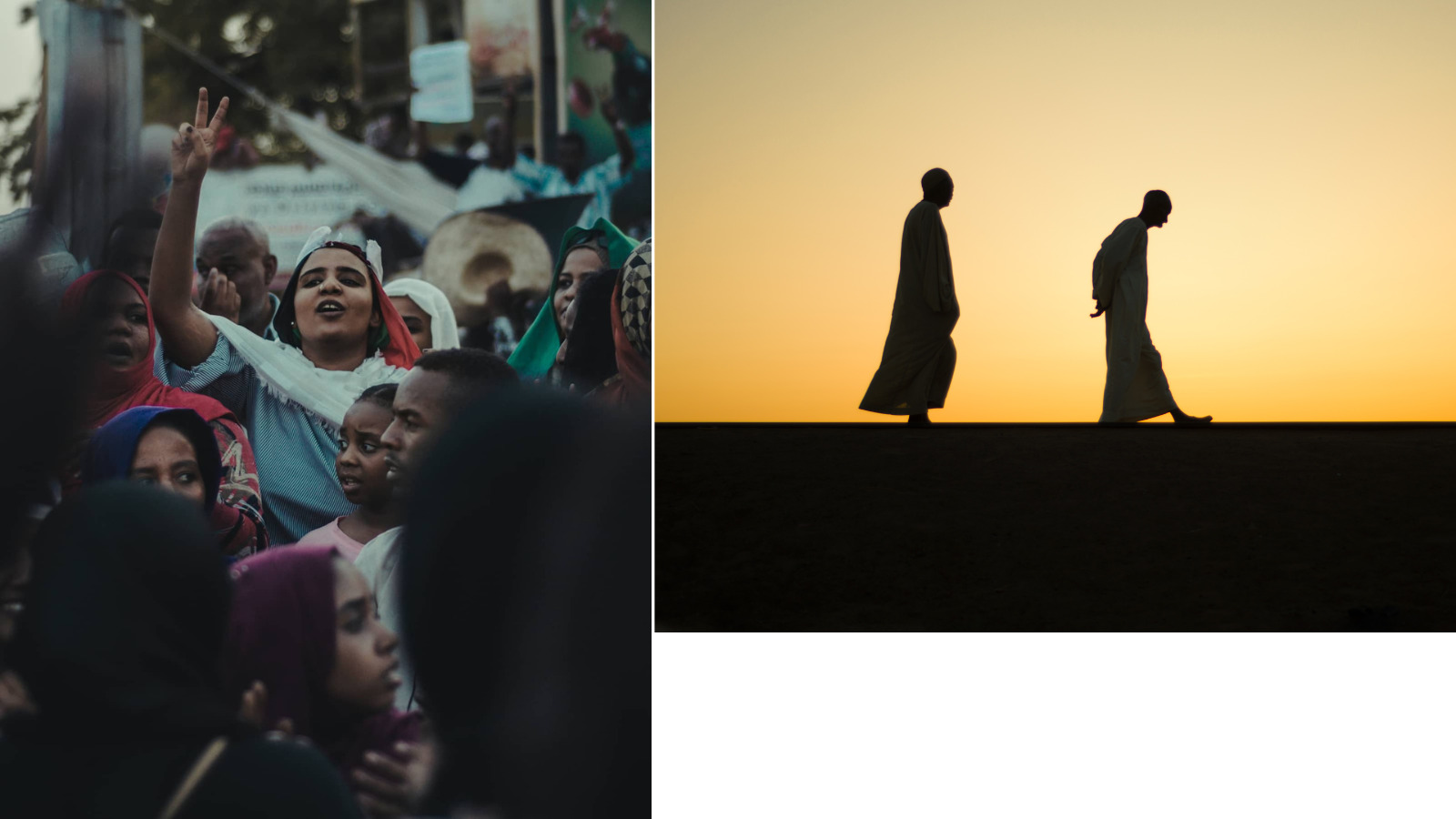
Left: A young lady waving the victory sign. Taken at the military HQ sit-in 2019. Photo by Hassan Kamil.
Right: Two of Kamil’s uncles walking on a trip down memory lane. Berber 2023. Part of “An Unexpected Tale From A No Longer-Forgotten City” project.
It held great significance for me to address the disregard that our cities have endured and to champion the recognition of their beauty and richness.
Following the outbreak of war, engaging in the creative process has served as a cathartic outlet for me to navigate the feelings of frustration, anger, and sorrow and my subsequent displacement.
Initially, I embarked on my latest project as a means of conveying my emotions, but over time, I recognized a profound sense of responsibility to raise my voice not just for myself but also on behalf of the millions who have shared similar experiences.
I firmly believe that our voices hold immense importance, and the compelling power of storytelling has the capacity to drive us to contemplate our situation, open deep conversation and dialogue about our present and past, and nonetheless advocate for transformative change in the future.”
To learn more about Hassan’s story, read his photo essay, “An Unexpected Tale From a No Longer-Forgotten City.”
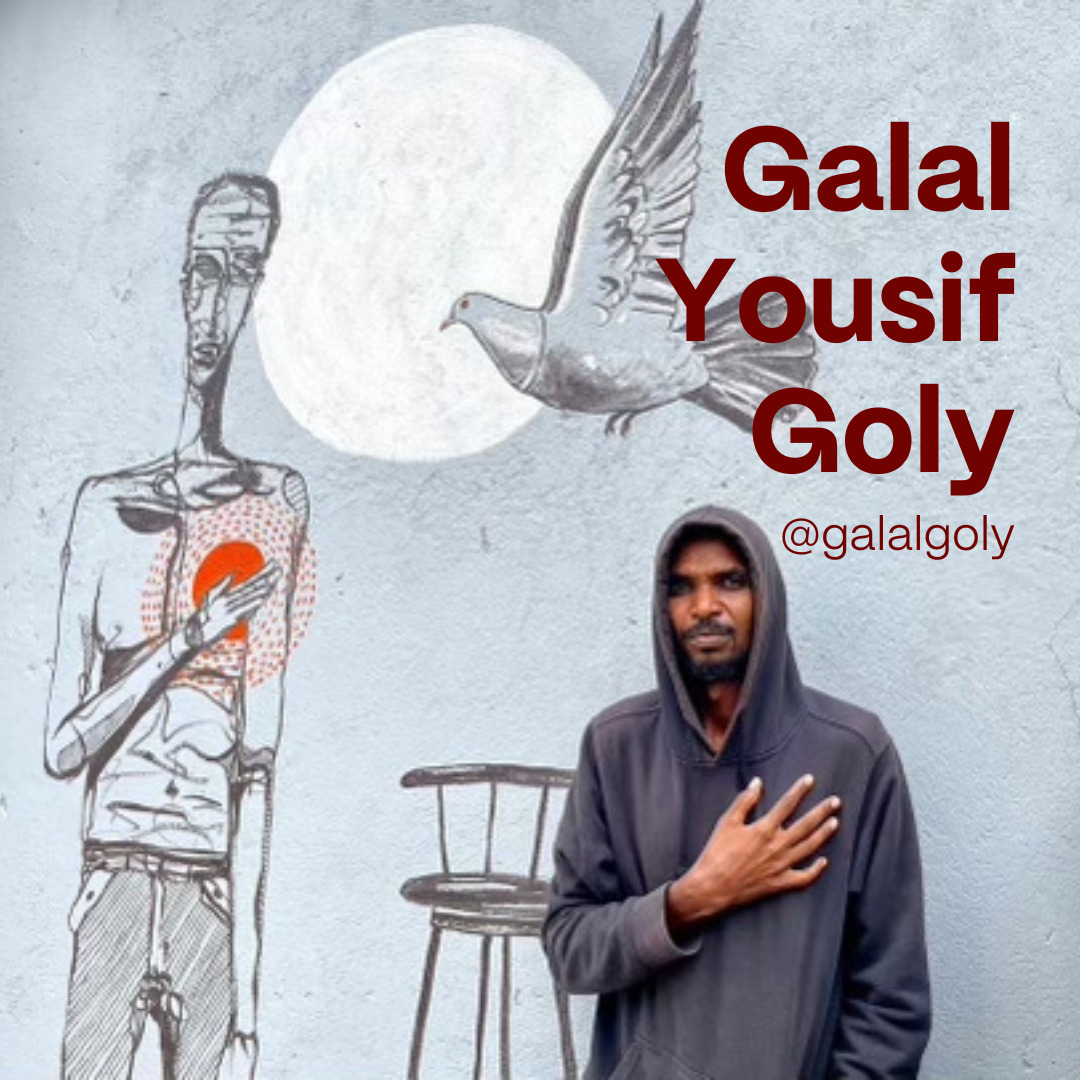
Galal is a multimedia Sudanese artist committed to pushing Sudan into the spotlight of activism.
“Sudan is witnessing the world’s largest displacement crisis, over [10] MILLION Sudanese have fled their homes.
Nobody cares.
The world is keeping silent.”
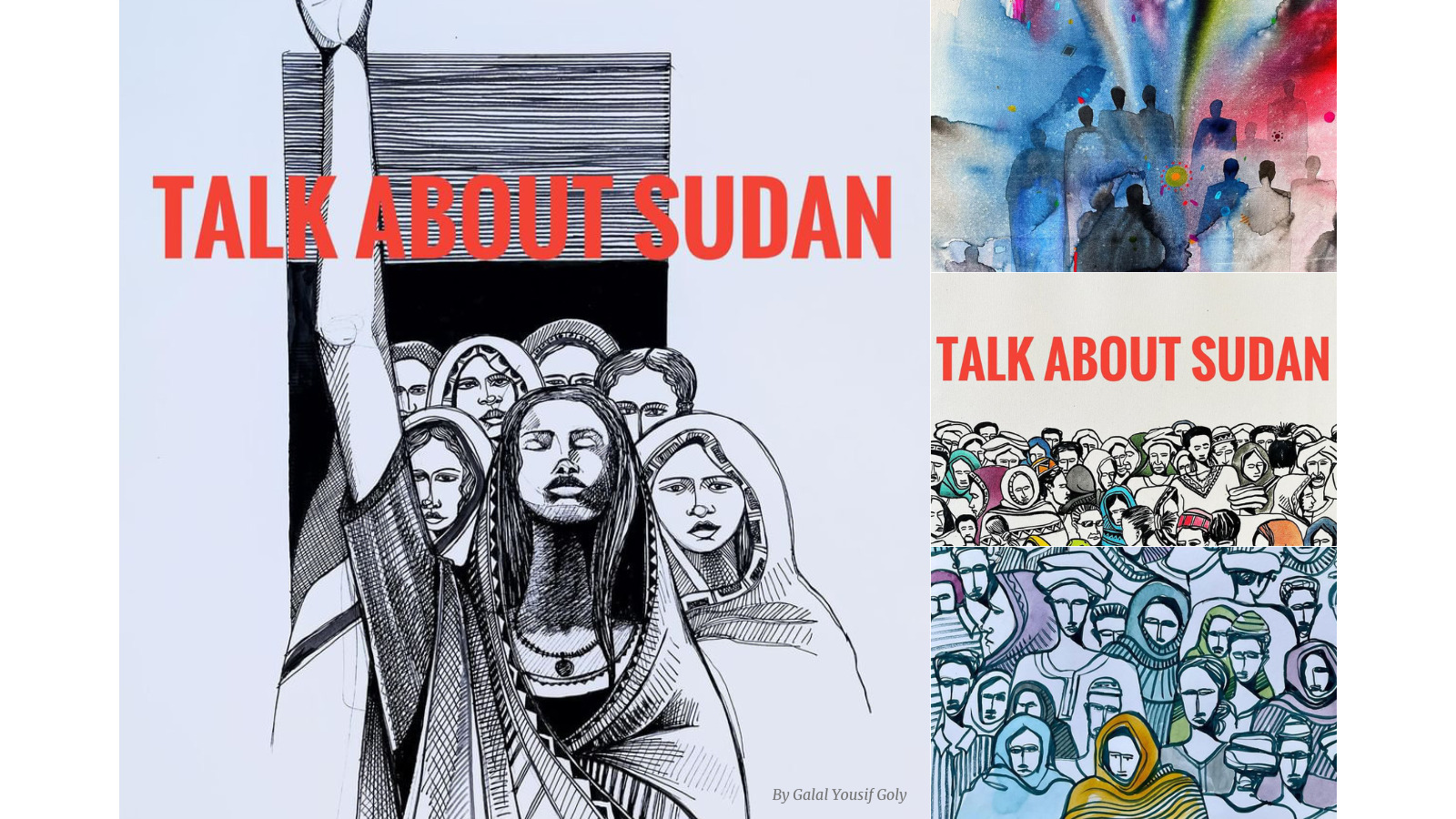
BBC NEWS: Sudan war: Heavy hearts for the artists painting the pain of conflict
Ismail Einashe
“I paint my pain.”
As an artist, he says his mission is to turn his personal experience into a collective visual narrative, offering a powerful glimpse into the “many people lost” in Sudan and the heavy toil of a “useless war”.
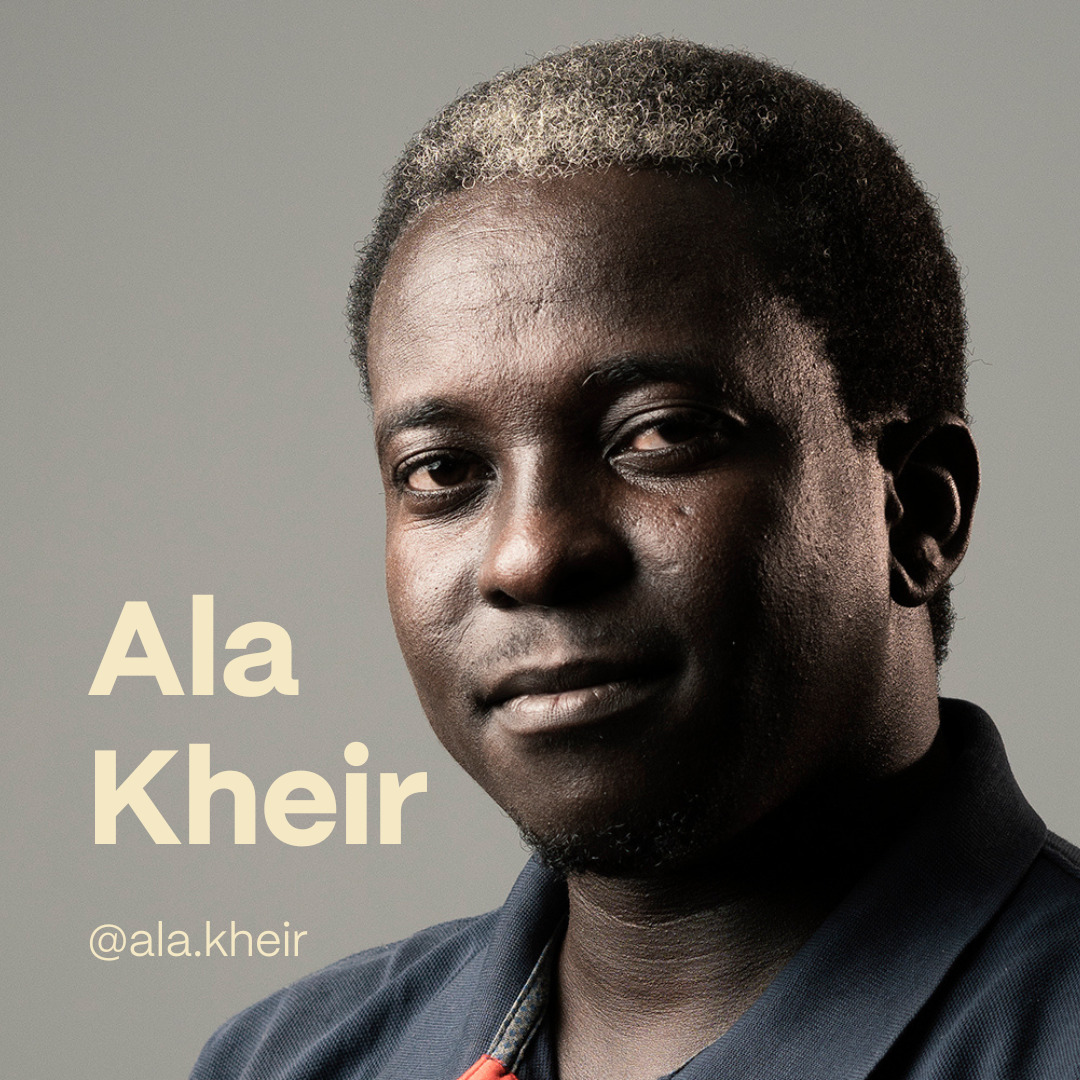
Ala is a Sudanese photographer who conveys both the complexity and beauty of Sudan through his art.
“I have been documenting the harsh realities of conflict and displacement in my hometown Darfur since 2012, trying my best to convey how it affected people I know, and places that I connect to.
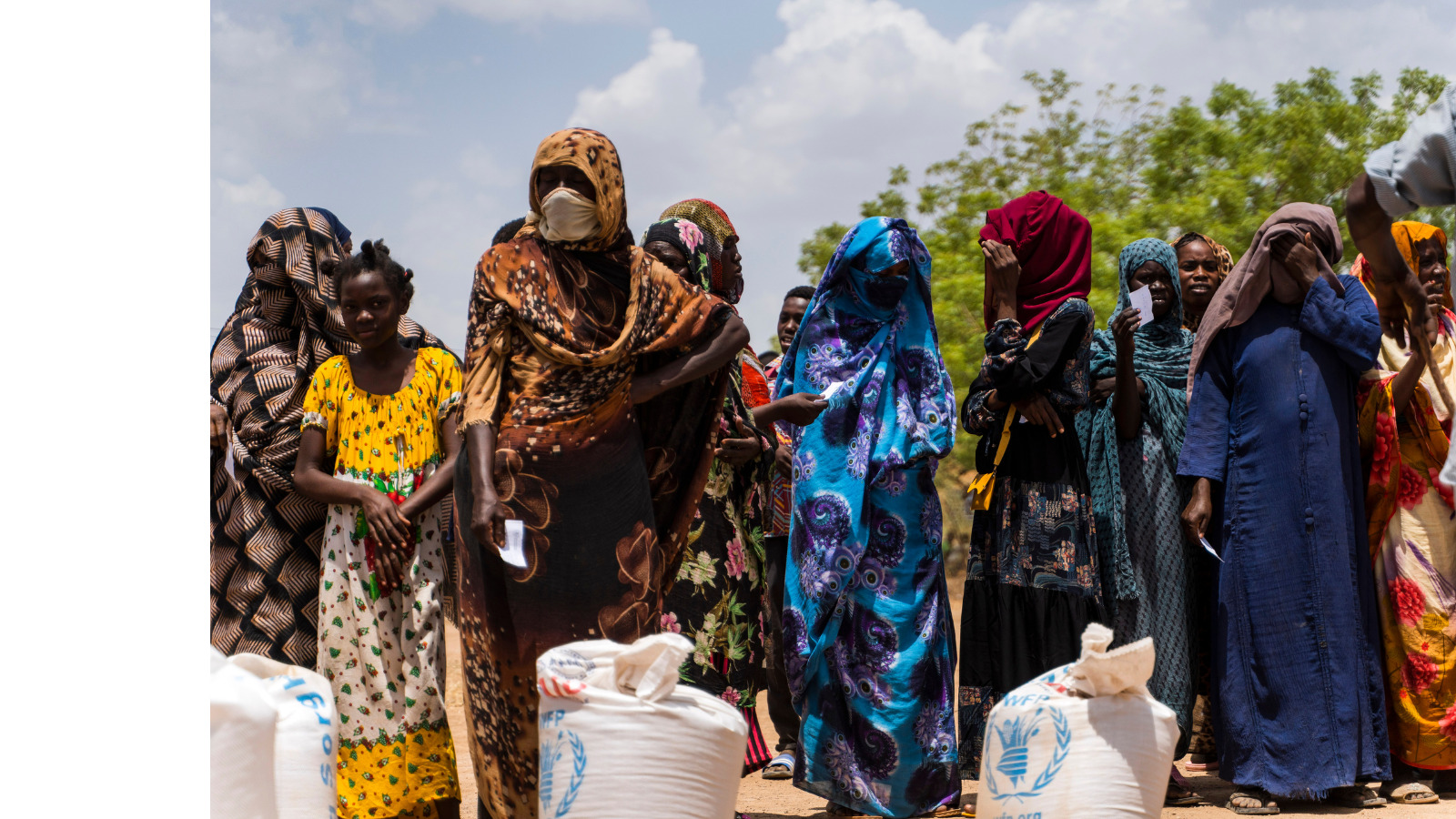 Above: Wad Madani, Jazeera state. Sudan. Photo by Ala Kheir.
Above: Wad Madani, Jazeera state. Sudan. Photo by Ala Kheir.
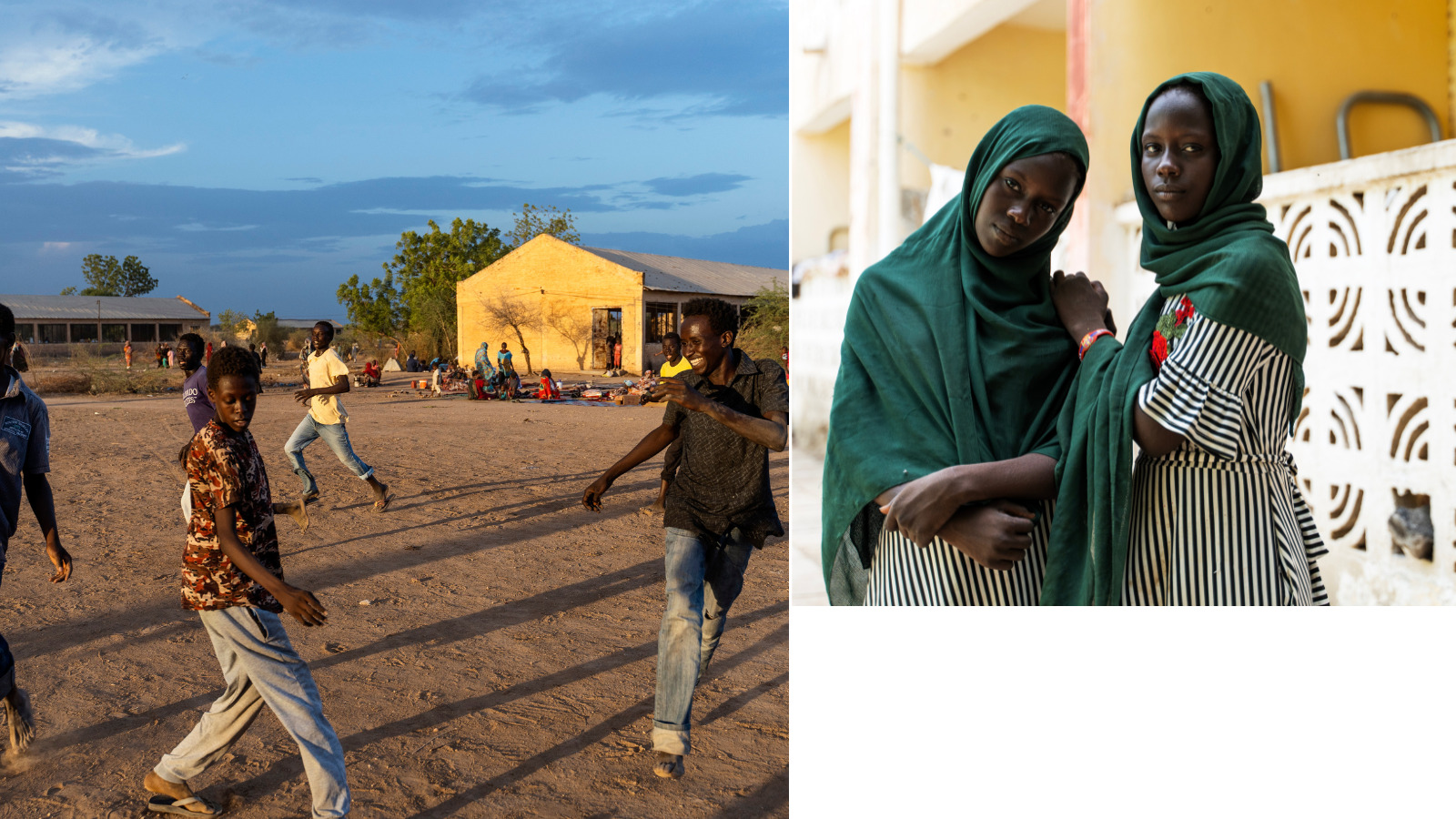
Left: IDPs in Wad Madani have nowhere to stay. This was an abandoned poultry farm, and these hangers are hosting 1100 IDPs. Wad Madani, Sudan. Photo by Ala Kheir.
Above: Suha and Suhaila Ahmed, the 12 years old twins from my hometown Nyala. With their family, they crossed 2,360 km from one town to the next looking for a safer place to stay. The sisters and their sick mother ended up in the humid and hot Port Sudan. They now live temporarily in a hostel that hosts many IDPs from different parts of the country, waiting for the war in Khartoum to end. Port Sudan, Sudan. Photo by Ala Kheir.
However, witnessing the impact of conflict on one’s own life adds layers of complexity to the narrative. This time I am the observer and I am the observed. And to this moment, I did not have the chance to “pause” and think.
But I try to keep going and continue letting the world know about what is going on in Sudan, and what it means to be a Sudanese today.”
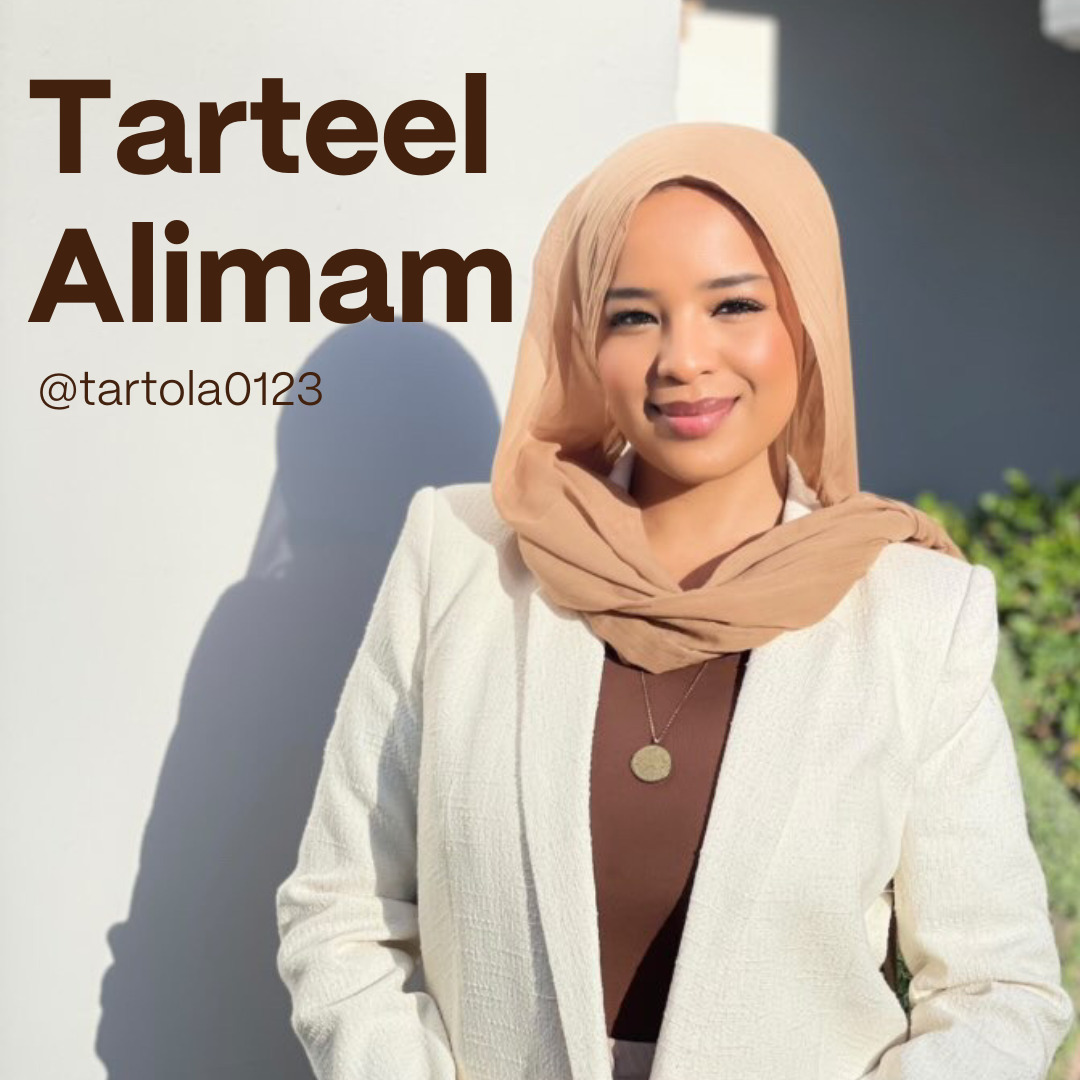
Tarteel is a Sudanese-American organizer, poet, activist, and social media content creator. She is the Executive Administrator at the Arizona branch of CAIR National and serves on Sudanese Diaspora Network board of directors.
“Being Sudanese is not just a part of who I am, it is all of me.
Sudanese people have always worked in community, during the good times and the difficult times. They come together in times of celebration and in times of revolution.
I am not an organizer because of skills I’ve learned in the West, I am an organizer because I am Sudanese.
Because my mother, grandmother and aunts are all organizers.
I am a poet, artist, writer, because my father and grandfather are writers.
These are qualities passed down from generations, and these are qualities that make us revolutionaries. Even amidst war, you can see community members resisting through mutual aid.
Sudanese people are the most community oriented and community empowered groups.
I see it in the youth, as we come together to raise funds for Sudan, to work with one another to raise awareness about our country.
I see it in our elderly, who wove the foundational threads that we are now putting together.
And this is how I know we will persevere as long as we hold each other close, in community.”
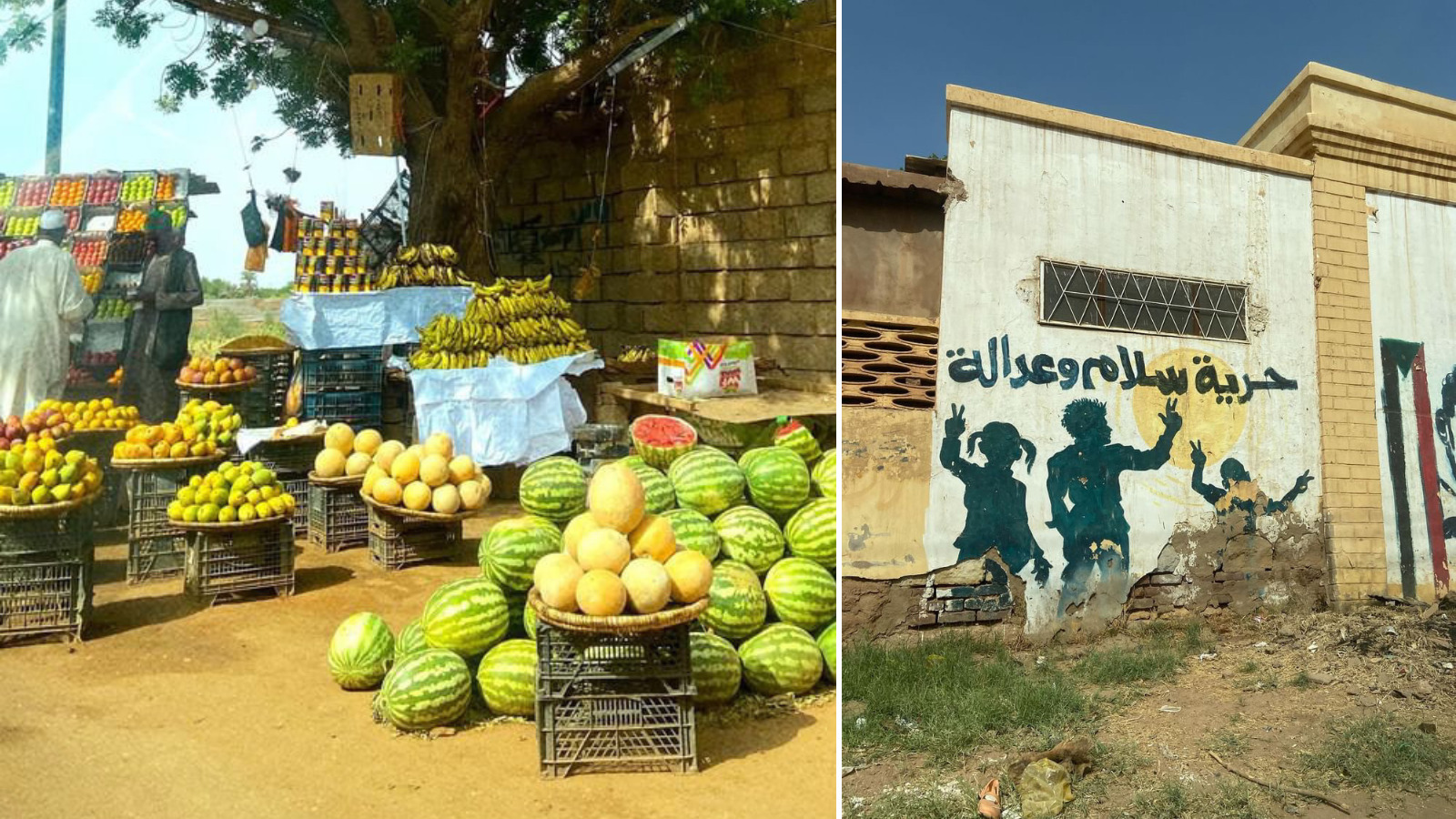
Left: “Some of the most delicious fruits I’ve eaten in Sudan came from these street stands. Passing by this everyday on my way back home was a staple part of my routine. The fruits always tasted sweeter here.” Photo by Tarteel Alimam.
Right: “The text in the photo reads ‘Freedom, Peace, Justice.’ The demands of the Sudanese people after the 2019 revolution, drawn in a neighborhood in Omdurman. The revolution birthed so much art and hope in the streets of Sudan. Sudanese people painted their dreams in vibrant colors on the streets.” Photo by Tarteel Alimam.
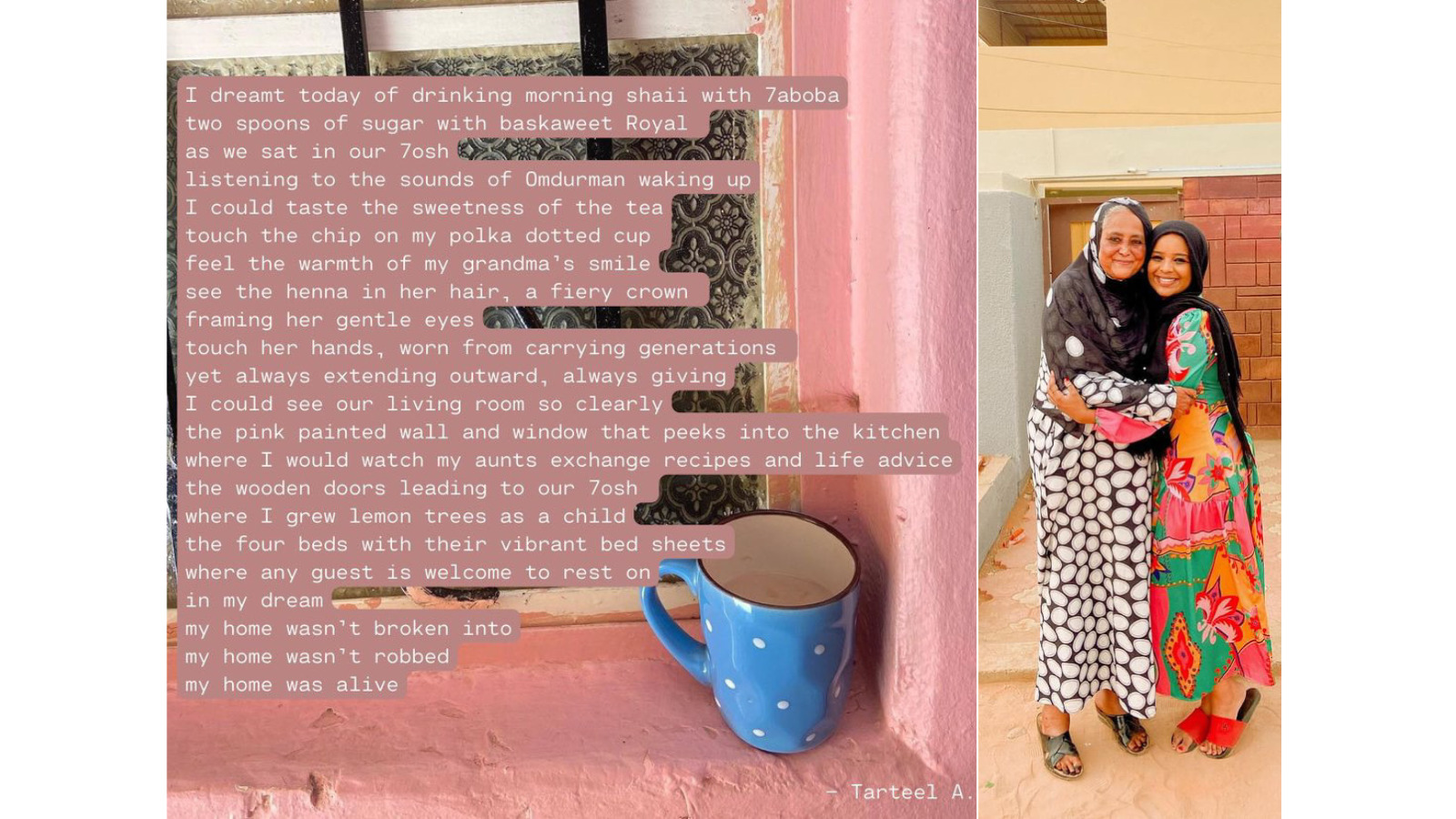 Left: Poem by Tarteel Alimam
Left: Poem by Tarteel Alimam
Right: “There’s no warmth like the warmth of an embrace from my grandmother, Sumaya. She embodies strength, kindness and love. Pictured in front of our house in Omdurman, after we came back from running errands together.” Photo by Tarteel Alimam.
Featured Image: From left to right, NUAAR Media logo and headshots of Galal Yousif Gold, Tarteel Alimam, Daad Khidir, Ala Kheir, G-SALIH, and Hassan Kamil.
Source link : https://www.refugeesinternational.org/perspectives-and-commentaries/one-year-on-sudanese-voices-are-still-speaking-out-on-sudan/
Author :
Publish date : 2024-04-23 07:00:00
Copyright for syndicated content belongs to the linked Source.





